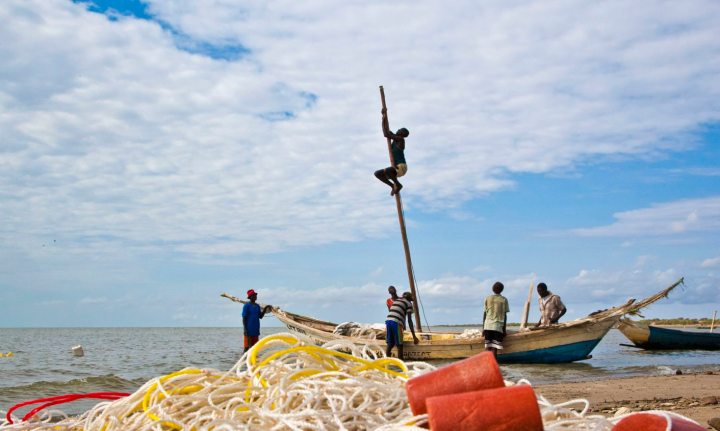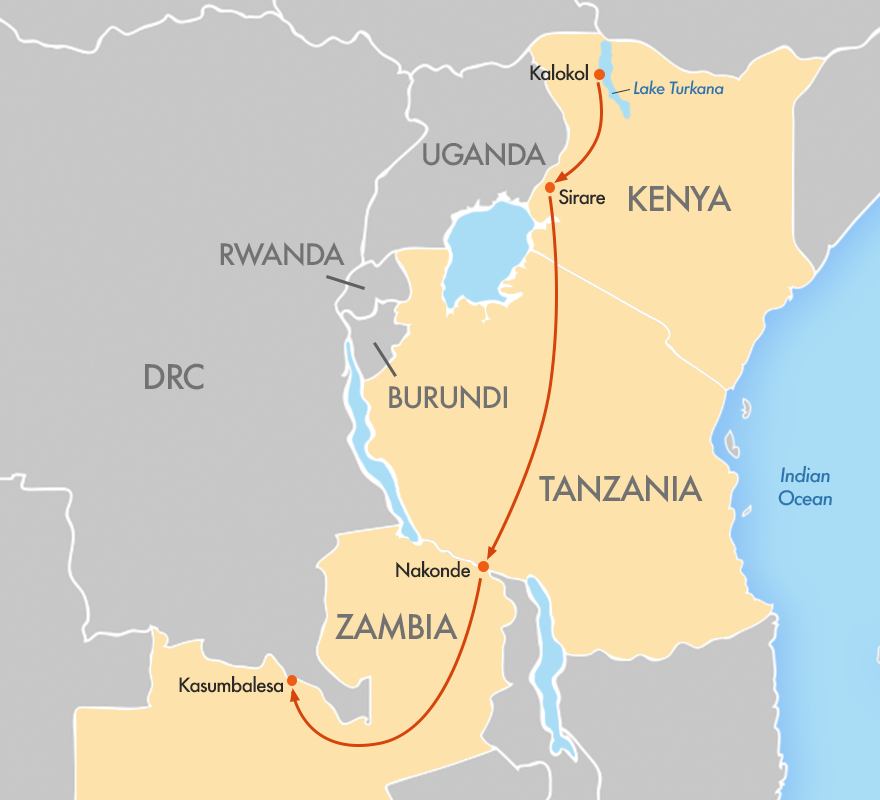ISS TODAY ANALYSIS
Smuggling threatens entire tilapia species of Kenya’s Lake Turkana

As corrupt officials from Kenya to the DRC prosper, the world’s only permanent desert lake faces ecological disaster.
Lake Turkana in Northern Kenya loses hundreds of tons of immature tilapia fish monthly through smuggling. Harvesting the fish threatens the existence of the entire species and the unique ecology of the world’s only permanent desert lake.
It also diminishes the food security of local communities who depend on tilapia for sustenance and income, and leads to a loss of revenue for both Turkana county and Kenya’s government.
In November 2021, the Ugandan Fisheries Protection Unit confiscated 300 tonnes of immature dry fish worth $1,712,329 at the Mpondwe border in Kasese District. The fish originated from Kalokol, a town on Lake Turkana’s shore, and were destined for the Democratic Republic of the Congo (DRC).
Recent investigations reveal a regional fish smuggling network comprising Kenyans, Ugandans, Tanzanians and Congolese nationals. The network facilitates the illegal harvesting, transportation and supply of immature fish from Lake Turkana through either Tanzania or Uganda into the DRC. Demand for juvenile fish — mainly tilapia — is high in the DRC as they are cheaper than mature fish, a fisheries officer in Kalokol town told the Enact organised crime project.
Young fish from Lake Turkana are caught or trapped by locals for a living. Foreign smugglers often provide them with loans to purchase boats, nets and fuel, making them complicit in the criminal enterprise. The locals then sell to Kenyan traders, who in turn peddle the fish to foreign nationals who move the product into regional markets.
Tobias Okeyo, a clearing and forwarding agent at the Sirare border between Kenya and Tanzania, told Enact that immature fish were often smuggled from Kalokol to Sirare on Kenyan trucks. The haul is then loaded onto Tanzanian trucks that ferry the fish to Nakonde town on the Tanzania-Zambia border. From there, Zambian vehicles drive the illegal cargo to the DRC over the Kasumbalesa border.

Lake Turkana’s tilapia smuggling route. (Graphic: Amelia Broodryk/ISS, 2022)
Visit Daily Maverick’s home page for more news, analysis and investigations
To preserve the young fish for the long journey from northern Kenya to the DRC, the traders use Sevin dudu dust, an insecticide that kills maggots — and can harm consumers. Turkana’s public health department recently secured court permission to destroy five tonnes of dry fish, which was preserved using the insecticide — a practice that contravenes Kenyan public health regulations.
Investigations by the Daily Nation show that the trade in immature fish is facilitated and protected by authorities in Kenya and government officials along the illicit value chain from its source and into the DRC.
The Kenyan Fisheries Act outlaws the harvesting and trade of undersized fish. But enforcement and compliance are poor, mainly as a result of corruption among fisheries officers. One officer told Enact that the law required fish traders to obtain a licence and movement permit, but that foreign nationals often get these through irregular channels using Kenyan intermediaries. Fish exporters are also meant to have fish export and health permits.
Kenya’s county governments are mandated to issue fish movement permits, and according to the officer, smugglers often obtain permits from non-fish-producing counties. The officer cited cases where smugglers moving fish from Turkana county to Sirare at the Kenya-Tanzania border were found in possession of licenses from Trans-Nzoia County, which does not produce fish.
While showing these permits makes the movement of the immature fish appear legal, obtaining them from non-fish-producing areas is only possible through corruption. Smugglers work closely with compliance officers to obtain these licences.
The first line of protection is largely absent. There appears to be little political will to enforce the Fisheries Act that protects fish and undersized tilapia in Lake Turkana from irregular harvesting. Operational law enforcement is also limited. The removal of the Kenya Coast Guard and Marine Police from patrolling the lake’s 256 km shoreline due to mandate conflicts with the Fisheries Department emboldens smugglers. These government failures only increase ecological and economic harm in this sensitive ecosystem.
Preventing and controlling the illegal trade also requires an intervention from the East African Community (EAC) to inspect trucks carrying fish from Kenya. The fish handling, processing and distribution code of practice, which is in place but not enforced in the EAC, must be used.
Regional efforts to stem the smuggling of immature fish from Lake Turkana to the DRC will improve food security for local households. And regenerating the tilapia species would also help conserve the world’s only desert lake. DM
Willis Okumu, Senior Researcher, Enact Project, Institute for Security Studies (ISS) Nairobi
This article was produced by the Enact project. Enact is funded by the European Union and implemented by the Institute for Security Studies and Interpol, in affiliation with the Global Initiative against Transnational Organised Crime.
First published by ISS Today.




















Comments - Please login in order to comment.